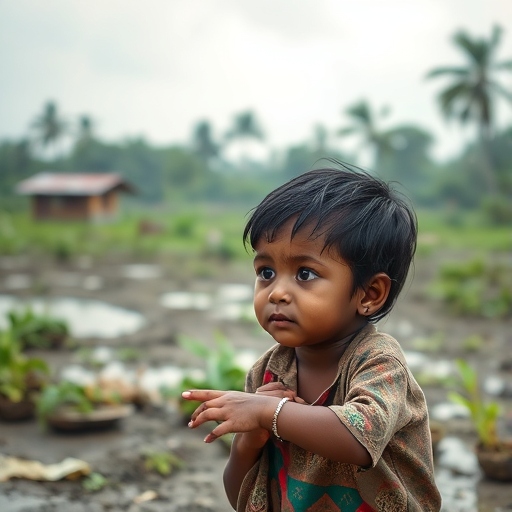Highlight 8/2025: Lifting the veil: What is the impact of the climate crisis on children’s lives in Bangladesh?
Nikol Petkova, 7 January 2025

“On an increasingly crowded planet, humanity faces many threats, but none is greater than climate change.” – King Charles III
Every child is entitled to equal rights, a safe environment, and the fundamental right to life. Yet, today, children face increasing vulnerability, particularly in Bangladesh, as extreme weather conditions intensify, threatening their safety and well-being.
Bangladesh stands among the nations most acutely vulnerable to the impacts of climate change, with vast portions of its terrain lying just a few meters above sea level. This makes the nation highly susceptible to severe flooding. The intensifying effects of climate change, exacerbated in recent years, have compounded these challenges, with stronger and more frequent storms further endangering the nation and its citizens, particularly its children.
On June 23, 2024, Bangladesh experienced the onset of severe heavy rain, marking the beginning of a protracted crisis. September 2024, the country faced unprecedented flooding, described as the worst in history. According to UNICEF, the catastrophic floods have imperilled the lives of over two million children in eastern Bangladesh, as homes, schools, and entire villages have been swept away or rendered uninhabitable. The floods also left many without access to critical resources such as safe and clean drinking water-indispensable for cooking, washing, and sanitation. For children in Bangladesh, the repercussions are profound and life-threatening, manifesting in malnutrition, inadequate sanitation, and the spread of dangerous diseases.
Water, an essential natural resource, plays a pivotal role in safeguarding children’s health. UNICEF’s WASH Program works to expand access to safe drinking water through the distribution of home filtration systems. As part of its climate change agenda in Bangladesh, UNICEF prioritises comprehensive interventions across key areas, including health, nutrition, education, water, sanitation, and hygiene (WASH), and child protection, to safeguard the well-being of the country’s most vulnerable population.
While UNICEF, as the leading UN agency dedicated to safeguarding children globally, has been actively engaged in Bangladesh since the onset of the disaster, the scale of the crisis far surpasses available resources. There is an immediate and pressing need for support, including financial assistance and life-saving medical supplies. Equally imperative is the swift restoration of primary healthcare services, which are vital for providing adequate care to newborns and ensuring the safety and well-being of pregnant women. Numerous families have been forced to seek refuge displacement camps after their homes became uninhabitable. However, these camps often lack adequate protective measures, leaving women and girls particularly vulnerable to the pervasive threats of abuse and violence. At present, discussions diverse management policies aimed at mitigating the risks associated with flooding in Bangladesh.
The climate crisis is inherently a child rights crisis, and according to UNICEF’s Children’s Climate Risk Index, children in Bangladesh are the most vulnerable globally to climate and environmental hazards. The urgency for decisive action cannot be overstated – children’s lives and well-being are relentlessly jeopardized by the pervasive challenges posed by climate change, every moment of every day.
Nikol Petkova, Highlight 8/2025 – Lifting the veil: What is the impact of the climate crisis on children’s lives in Bangladesh?, 7 January 2025, available at www.meig.ch
The views expressed in the MEIG Highlights are personal to the authors and neither reflect the positions of the MEIG Programme nor those of the University of Geneva.
